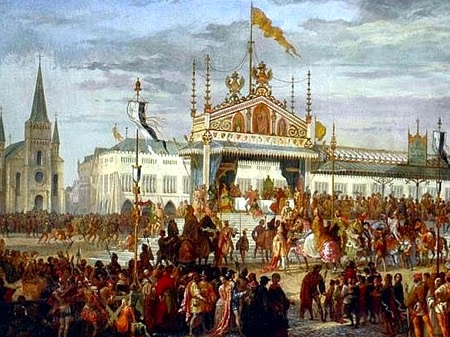 |
| Golden Bull of 1356 |
Holy Roman Emperor Charles IV (r. 1346–78) established a kind of constitution for the Holy Roman Empire in 1356, calling the document in which the new rules were laid out the “Golden Bull” (Bulla Aurea).
It was called by that distinctive name for two reasons: first, because of the medieval practice of affixing to official documents and important such declarations seals (Latin, bulla), the Latin word was transliterated into the English word bull and came to signify such official documents themselves; second, because the particular seal on this important document was cast in gold it is the “Golden Bull.” However its significance does not lie primarily in its name, but in its fundamental importance to the Holy Roman Empire’s future.
The Holy Roman Empire was at different times a loose confederation of central European principalities. The various princes of the region cooperated to some degree as sovereigns and practiced election of an emperor. The year 1346 marked Charles IV’s election as emperor.
  |
By 1356 Charles IV, also king of Bohemia, realized that unlike in France and England, where monarchy had more firmly established itself and created more unified states, the Crown of the Holy Roman Empire was relatively weak to unify the mostly German principalities. Lacking the ability to forge unity, and seeing the Holy Roman Empire as a confederation of states and the emperor as first among princes of equal stature and power, Charles IV formulated the Golden Bull in 1356.
The document sought to bring an imperial peace and more stable form to this confederation of mostly German principalities, which was characterized by diverse cultures, customs, ways of life, and languages. As a reform and restatement of the ancient constitution of the Holy Roman Empire, it would form a basis of government for the empire as the foundational constitutional document, until the empire was dissolved by Napoleon Bonaparte in the year 1806.
Though some see the Golden Bull as creating anarchy in the name of constitutionalism, and others call it the Magna Carta of the German states, it was primarily concerned not with individual rights, but with the duties and rights of the princes who elected the emperor and helped him rule the empire.
Articulated in 1356 at imperial diets at Nuremberg and Mainz, it formed the basis of imperial elections and set the number of electors at seven. It gave the seven electoral princes extensive rights including the privilege of both nomination and selection of the emperor. Stipulating that the king of Bohemia, who was then Charles IV, was to be one of the electors, it also elevated him over the other elector princes.
In addition to the king of Bohemia, other electors were to be the archbishops of Mainz, Trier, and Cologne; the margraves of Miessen and Brandenburg; and the counts Palatine of the Rhine. Charles IV’s hope was that this arrangement would not only create unity among the elector princes and a balance of power, but also ensure hereditary succession through the regulated process of election.
Producing the “king of the Romans,” as the Golden Bull called the elected emperor, it limited participation to the seven elector princes, even disallowing any direct participation by the pope. Voting was regularized specifically, and a majority of four votes was sufficient for election, which would culminate in coronation by the pope in Rome. It also strengthened the individual positions of the seven electors within the empire.
These “pillars” became a “college,” above the various legal estates of clergy, townspeople, and nobility. To alleviate the temptation to divide up electoral votes, the territories of the seven elector princes were made indivisible by inheritance. The princes also gained powers that accrued to them personally, such as the right to capital justice, and control of local mining, tolls, and coinage.
Seven copies of the Golden Bull of 1356 still exist, having been preserved by several of the electoral princes and the cities of Nuremberg and Frankfurt. An interesting document, it limited government in the Holy Roman Empire, if only by ending the legal possibility of a hereditary empire in favor of an elective, if still very exclusive position as “king of the Romans.”